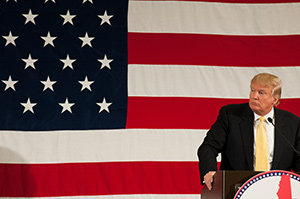Characteristically, stocks and bonds rendered diametrically different verdicts on Donald Trump's victory in last Tuesday's presidential election. While the Dow Jones Industrial Average enjoyed its biggest rally in five years, jumping 5.4%, or 969.38 points, to close at a record high of 18,847.66, yields on 10- and 30-year Treasuries jumped 32 and 34 basis points to 2.15% and 2.94%, respectively. The S&P 500 jumped 3.8% on the week to 2,165.45, and the Nasdaq Composite Index rose 3.79% to 5,237.11.
While global equities added $1.3 trillion in value, however, global bonds shed $1.0 trillion according to Bloomberg estimates. President-elect Trump is expected to bring higher GDP and corporate profits, which are good for stocks, but also higher inflation and interest rates, which are bad for bonds. Bonds were already toxic, offering negative real (inflation-adjusted) returns, before the election; now investors are going to see exactly how much damage feckless central bank policies inflicted as the $1 trillion of losses of the last week are just a small down payment on what is coming.
Mr. Trump is inheriting a complicated and very volatile situation.
And if I were advising him, here's what I'd suggest.
President-Elect Trump Should Prepare for a Seismic Shift
 It appears highly likely that the Fed will move forward with a 25 basis point interest rate hike in December. The futures market is putting an 84% probability on such a move and the stock market rally will certainly embolden the chicken-hearted Fed governors to move. But futures are only pricing in one additional 25 basis point move in 2017, suggesting how little credibility the world's most important central bank retains after years of failed policy.
It appears highly likely that the Fed will move forward with a 25 basis point interest rate hike in December. The futures market is putting an 84% probability on such a move and the stock market rally will certainly embolden the chicken-hearted Fed governors to move. But futures are only pricing in one additional 25 basis point move in 2017, suggesting how little credibility the world's most important central bank retains after years of failed policy.
Don't Miss: Turbocharge your investing returns with our top 5 money-making investment reports. Get them now - they're absolutely free. Click here...
If I were advising President-elect Trump, I would advise him to ask for the resignations of every member of the Federal Open Market Committee (starting with Janet Yellen and Stanley Fisher). I would replace these intellectuals-yet-idiots with men and women with real world experience running companies and exclude from consideration professional economists and academics.
Of course, that is only one piece of a very delicate balancing act.
The question now is whether the stock market can overcome rising bond yields and keep rallying. As Gluskin Sheff's David Rosenberg points out, equities' reliance on central banks' easy money meant the difference between the S&P 500 trading at 1,700 or 2,100. Cheap debt was used to finance record levels of stock repurchases and the biggest M&A booms on record while companies struggled to generate organic earnings. The expected shift from monetary policy to fiscal policy stimulus may not be all good news as it brings higher inflation and higher interest rates to a highly leveraged corporate sector.
[mmpazkzone name="in-story" network="9794" site="307044" id="137008" type="4"]
Even if lower tax rates and repatriation of the reported $2 trillion of offshore corporate cash can offset the effects of higher interest rates, this won't solve the threat of the exploding federal deficit. America cannot afford trillions of dollars of stimulus even if it comes in the form of tax relief, regulatory relief, and infrastructure and military spending (and most of the infrastructure spending should be focused on military and similar areas) because these activities will not sufficiently increase the economy's ability to pay the debt that will be incurred to pay for them. Bond markets will balk at the trillion-dollar deficits that are likely to return if entitlement reform is not addressed. While it is difficult to bet against stocks rising further at the moment, we need to see how the new administration prioritizes its economic plans before making a determinative judgment on the direction of the markets.
Investors should buckle up for more volatility in the weeks and months ahead. Markets were both rooting for and assuming a Clinton victory. Ironically, however, a Clinton victory probably would have also meant more spending, higher interest rates, and more inflation. Markets were largely on hold for the last few months, however, as the weakness of the Clinton candidacy and the obvious failures of the Obama administration (i.e., Obamacare, etc.) created the possibility of a Trump victory. On the plus side, the death of the Clinton dynasty also means we can bury Barack Obama's economy-crushing regulatory assault on American business, which will be good for markets in the long run.
Markets will now adjust, though it will not be a smooth ride. But it will be a breath of fresh, politically incorrect air. God bless America!
This Is the Best "Retirement Stock" of 2016... And the good news is, it's trading for "pennies." But it won't be for long... its revenue is set to surge 4,709%. Learn the details of this $5 stock today while it's still "on sale." Read more...
Follow Money Morning on Facebook and Twitter.
About the Author
Prominent money manager. Has built top-ranked credit and hedge funds, managed billions for institutional and high-net-worth clients. 29-year career.



